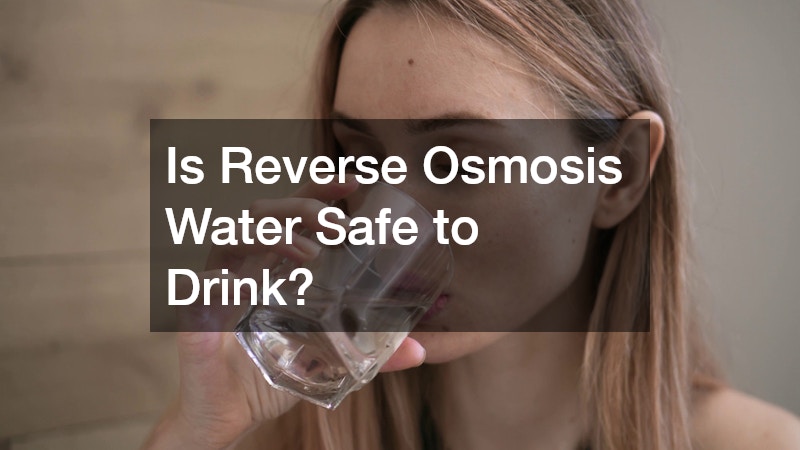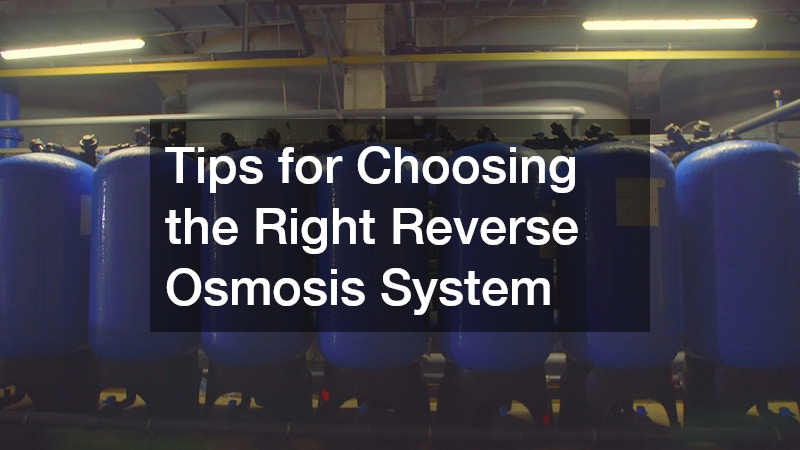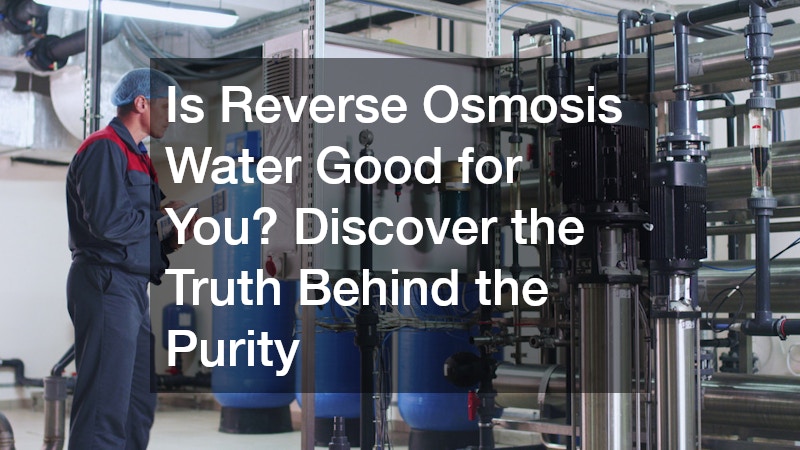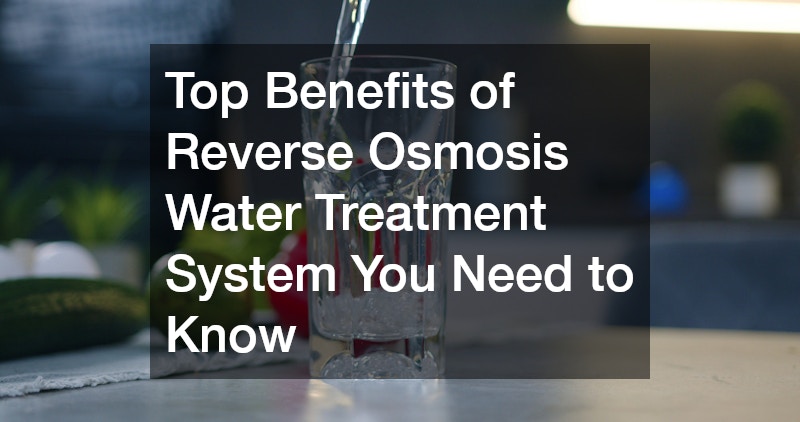
Clean, safe drinking water is a top priority for homeowners, families, and individuals alike. With increasing concerns about contaminants like lead, pesticides, heavy metals, and pharmaceuticals in tap water, many people are turning to water purification systems for peace of mind. Among these, Reverse Osmosis (RO) systems have become especially popular. But with all the hype around RO water, one question remains: Is reverse osmosis water actually good for you?
In this article, we dive deep into the science, benefits, concerns, and common misconceptions surrounding reverse osmosis water. Whether you’re considering installing an RO system or simply want to make more informed decisions about your family’s water quality, this guide provides a comprehensive look at the truth behind the purity.
What is Reverse Osmosis and How Does It Work?
Reverse osmosis (RO) is an advanced water filtration process that works by forcing water through a semi-permeable membrane. This membrane selectively allows water molecules to pass while blocking impurities such as chemicals, heavy metals, and microorganisms, resulting in cleaner and safer drinking water.
Some of the substances that RO systems effectively remove include:
- Heavy metals like lead, mercury, and arsenic
- Disinfectants such as chlorine and chloramines
- Harmful microorganisms, including bacteria and viruses
- Excessive levels of fluoride and nitrates
- Trace pharmaceuticals and microplastics
A typical RO setup includes several stages of filtration. These often begin with a sediment filter to catch larger particles, followed by an activated carbon filter to reduce chemicals and odors. The heart of the system is the RO membrane, which handles the bulk of purification. Many modern systems also incorporate additional stages, such as post-carbon filters or a remineralization unit, to improve taste and restore essential minerals.
In simple terms, RO water is extremely pure, so pure that it removes almost all dissolved solids from water. But does that level of purity have a downside?
Is Reverse Osmosis Water Safe to Drink?

Understanding the Safety Profile
For the most part, reverse osmosis water is safe—and even beneficial—for human consumption. It eliminates potentially harmful contaminants that may be present in municipal or well water. This is especially important for people with compromised immune systems, children, and the elderly.
However, one key concern critics raise is that RO water also removes beneficial minerals, such as calcium, magnesium, and potassium. While this is technically true, it’s important to put things in perspective:
- The body gets most of its essential minerals from food, not water.
- The mineral content in water is generally minimal and not a significant dietary source.
- Many RO systems offer remineralization filters that add healthy minerals back into the water.
Bottom line: RO water is safe to drink, and concerns over demineralization are often overstated, especially if you maintain a balanced diet.
The Health Benefits of Drinking Reverse Osmosis Water
Cleaner Water, Healthier Body
Drinking reverse osmosis water can offer several health benefits by removing harmful substances from your drinking water supply:
- Reduces exposure to contaminants: Removes up to 99% of bacteria, viruses, and heavy metals.
- Supports digestive health: Eliminating chlorine and chloramines can prevent gastrointestinal issues.
- Improves taste and smell: RO water tastes fresher and cleaner, which may encourage increased hydration.
- Reduces chemical intake: No fluoride, chlorine, or volatile organic compounds (VOCs).
- Good for sensitive individuals: Ideal for babies, seniors, and people with weakened immune systems.
Pro tip: If you’re using RO water for cooking or making baby formula, you’re giving your family an extra layer of protection from unwanted substances.
Are There Any Downsides to Reverse Osmosis Water?
Addressing the Concerns
While RO water is generally safe, it’s important to acknowledge some potential drawbacks:
1. Loss of Minerals
- As mentioned earlier, RO removes both contaminants and essential minerals.
- While this isn’t harmful in itself, it may affect taste, and some people prefer water with natural minerals.
2. Acidic pH
- RO water tends to be slightly more acidic due to the absence of buffering minerals.
- Some people believe acidic water can upset stomach pH balance, but there’s little evidence to support serious health effects.
3. Wasted Water
- RO systems typically waste 2–3 gallons of water for every 1 gallon purified.
- Newer models and zero-waste systems are becoming more efficient.
4. Initial Cost and Maintenance
- RO systems can be more expensive to install and require periodic filter replacements.
Despite these concerns, most of them can be addressed with the right setup, such as adding a remineralization filter or choosing a more efficient RO model.
Is Reverse Osmosis Water Right for Your Family?
Tailoring Water Solutions to Your Household Needs
Whether or not RO water is ideal for you depends on a few factors:
✔️ Consider RO Water If:
- You have well water or live in an area with poor municipal water quality.
- You or your family members are immunocompromised.
- You want to reduce your exposure to contaminants, chemicals, and pollutants.
- You’re concerned about long-term health and want the cleanest water possible.
❌ Think Twice If:
- You rely heavily on minerals from water sources.
- You dislike the flat taste of mineral-free water.
- You’re on a very limited budget and cannot afford system maintenance.
If you fall into the second category, you can still enjoy RO water with adjustments, like a remineralization stage, which improves both taste and mineral content.
How Does Reverse Osmosis Compare to Other Filtration Systems?
Comparing Your Options
Let’s compare RO with other common filtration methods:
| Feature | Reverse Osmosis | Carbon Filters | UV Filters | Distillation |
| Removes Heavy Metals | ✅ | ❌ | ❌ | ✅ |
| Removes Bacteria & Viruses | ✅ | ❌ | ✅ | ✅ |
| Removes Fluoride | ✅ | ❌ | ❌ | ✅ |
| Taste Improvement | ✅ | ✅ | ❌ | ❌ |
| Mineral Removal | ✅ | ❌ | ❌ | ✅ |
| Cost | Moderate–High | Low | Moderate | High |
Reverse osmosis stands out for its broad contaminant removal range and is especially useful if you’re dealing with multiple unknowns in your water source.
Can Reverse Osmosis Water Be Remineralized?
Bringing Balance Back to Purity
One common question people ask is: Can you add the minerals back into RO water? The answer is yes—and it’s easier than you might think.
Here are some effective ways to remineralize RO water:
- Install a remineralization filter: Many RO systems now come with a final stage that reintroduces healthy minerals like calcium and magnesium.
- Use mineral drops: A few drops per liter can enhance the water’s taste and nutritional profile.
- Mix with mineral water: You can blend a small amount of natural mineral water into RO water.
- Use a mineral-rich water bottle: Special bottles have built-in cartridges that infuse minerals as you drink.
By remineralizing your water, you maintain the health benefits of contaminant removal while enhancing flavor and mineral content.
Why Reverse Osmosis Is a Game-Changer for Household Water Purity
In an age where tap water can contain everything from chlorine to trace pharmaceuticals, reverse osmosis has emerged as a trusted solution for families seeking better water quality at home. Unlike standard filters that only target certain contaminants, RO systems remove up to 99% of total dissolved solids, offering peace of mind with every glass. This level of purification is especially beneficial in areas with aging infrastructure or questionable municipal supplies.
For households with young children, elderly members, or anyone with health sensitivities, investing in an RO system is more than a convenience—it’s a proactive step toward long-term wellness and safety.
Tips for Choosing the Right Reverse Osmosis System

What to Look For
Not all RO systems are created equal. Here are features to consider:
- Multi-stage filtration: Choose at least 4 stages, including sediment, carbon, RO membrane, and post-filter.
- NSF certification: Ensures the system meets safety standards.
- Remineralization option: Restores healthy minerals and improves taste.
- Storage tank size: Make sure it fits your household consumption.
- Filter lifespan and maintenance cost: Look for systems with long-lasting filters and reasonable upkeep.
Some trusted RO brands include APEC, iSpring, Home Master, and Waterdrop.
Is Reverse Osmosis Water Good for You?
The Final Verdict
When it comes to the question, “Is reverse osmosis water good for you?” the overwhelming evidence points to yes, especially when used thoughtfully and with consideration for personal needs.
Here’s why:
- It provides clean, safe drinking water by removing up to 99% of harmful contaminants.
- It’s an ideal option for vulnerable groups like children and the elderly.
- Any drawbacks, like demineralization or acidity, are easily mitigated with modern filtration upgrades.
In short, if you want the highest level of water purity in your home, reverse osmosis is a smart investment.
Frequently Asked Questions About Reverse Osmosis Water
Quick Answers to Common Concerns
Q: Is it OK to drink RO water every day?
A: Yes. As long as you’re eating a balanced diet, daily consumption of RO water poses no health risk.
Q: Does RO water cause mineral deficiencies?
A: No. Most minerals come from food, not water. You can also add minerals back if desired.
Q: Is RO water good for pets?
A: Yes, although some experts recommend adding a few trace minerals for optimal health.
Q: Can you use RO water in humidifiers or CPAP machines?
A: Absolutely. RO water is ideal for devices requiring mineral-free water.
Conclusion: The Truth Behind the Purity
Reverse osmosis water is among the purest forms of drinking water available today. For households concerned about chemical exposure, contaminated tap water, or taste issues, it offers a compelling solution. While there are some minor drawbacks—like the loss of minerals or water waste—these can be easily managed with modern RO systems.
So, is reverse osmosis water good for you?
Yes, especially when you consider the health benefits, peace of mind, and long-term value it provides.
Whether you’re a parent looking to protect your children or a homeowner seeking the best water quality, RO water gives you control over what you and your loved ones consume every day.




